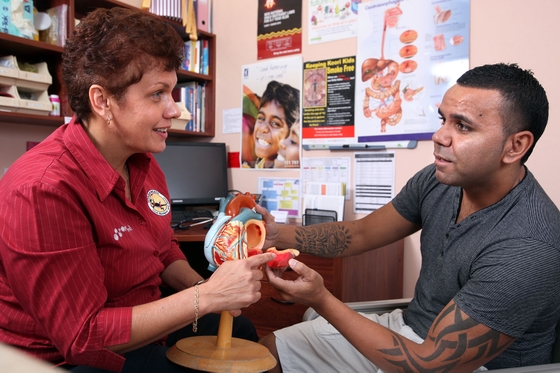
Time to book a Heart Health Check?
Key takeaways
3 min read
- 1.4 million Australians have a high chance of having a heart attack or stroke in the next 5 years. Many are unaware of this risk.
- A 20-minute Heart Health Check with your GP will help you understand your risk of a heart attack or stroke in the next 5 years.
- Your GP and nurse can support you to make positive changes to lower this risk.
What is a Heart Health Check?
A Heart Health Check with your GP will help you understand your risk of having a heart attack or stroke in the next 5 years and what you can do to prevent it.
Do you know what your risk of having a heart attack or stroke is?
Having a regular Heart Health Check with your GP will help you better understand your risk of a heart attack or stroke. Most importantly, your GP and nurse can support you to lower this risk. A Heart Health Check is a 20-minute check-up with your GP to assess your risk of having a heart attack or stroke.
Why should you get a Heart Health Check?
Heart disease is the leading cause of death in Australia. Many heart attacks and strokes can be prevented through healthy behaviours like following a heart-healthy eating pattern, being active, maintaining a healthy weight and being smoke-free.
Many people may not know their risk of developing heart disease, especially since you often can’t feel risk factors like high blood pressure and cholesterol.
Who needs a Heart Health Check?
You are eligible for a heart health check if you do not already have heart disease and are:
- 45 years and over
- 35 years for people living with diabetes
- 30 years for First Nations peoples
Speak to your GP about a Heart Health Check if you do not already have heart disease.
What should you expect in your Heart Health Check?
1. Discuss
There are many different factors that can all play a part in your risk of developing heart disease. Your GP or nurse may ask about:
- whether you smoke
- whether you have diabetes
- medicines you are taking
- other health problems
- your family health history
- ethnic groups you identify with
- your postcode.
2. Check
Your GP or nurse may check your blood pressure, cholesterol and blood sugar levels.
3. Assess
Your GP will work out your chance of having a heart attack or stroke in the next 5 years, using a clinically validated calculator.
4. Plan
Your GP or nurse will work with you to set a plan to lower your risk of heart attack or stroke. This may involve:
- ways to make heart-healthy changes to your lifestyle
- referrals to programs or other health professionals for more support e.g. dietitians
- prescribing blood pressure or cholesterol lowering medicines.
How much does a Heart Health Check cost?
Since April 2019, Heart Health Checks have been covered by Medicare and are free at practices that bulk bill this service.
Ask your GP about the cost of your Heart Health Check before your visit.
Building blocks for a healthy heart
While there is no one cause for heart disease, there are risk factors that increase your chance of developing it. The more risk factors you have, the more likely you are to develop heart disease.
Preventing heart disease starts with knowing your risk factors and making positive lifestyle changes to lower your risk. This animation will step you through some positive changes you can make to lower your risk.
What other support will you have to make healthy changes?
The Heart Foundation has plenty of free resources and activities that can help you make positive changes to your lifestyle:
- Eat healthy with our heart-healthy recipes.
- Be active by joining or leading a Heart Foundation walking group for free or sign up for a free 6-week Personal Walking Plan.
You might be interested in...

Aboriginal and/or Torres Strait Islander Peoples and the Heart Health Check
Cardiovascular disease is the biggest contributor to preventable morbidity and mortality among Aboriginal and/or Torres Strait Islander Peoples.

Seven surprising symptoms of heart disease
You’re probably familiar with some of the more ‘classic’ symptoms of heart disease. Chest pain (angina) which might feel like an uncomfortable pressure or heaviness. Palpitations or sensation of a racing heart. Feeling short of breath or having difficulty breathing.

Medical tests for heart disease
Discover the types of heart tests used to detect heart disease, heart blockages, or heart attacks, from routine heart tests to advanced tests for heart disease.
Last updated29 September 2025
Last reviewed19 November 2024


